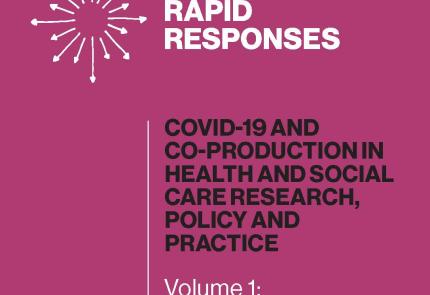One of the book’s editors is Dr Josephine Ocloo, ARC South London senior research fellow: community, equity, diversity, and inclusion (EDI). Dr Ocloo has also written the chapter 'Silenced Voices, Unequal Impact: addressing health inequities and discrimination in co-producing health and care during the pandemic and beyond'.
Her chapter highlights the anomaly that some groups, including Black, Asian and minority ethnic and disabled people and those living in the most deprived neighbourhoods and on the lowest incomes, face some of the worst health inequalities in society and have been most impacted by the pandemic. Yet, these are the groups who have also, often been most excluded in patient and public involvement and engagement (PPIE) and co-production. She calls for new thinking and practice to address racism and all forms of discrimination and to make this central in more community-based participatory processes in health, social care, and research.
Dr Ocloo says: “At ARC South London we are taking an approach to EDI that seeks to address exclusion holistically and at different levels – including structural, governance and in the research process. This will enable us to address the risks associated with different groups being excluded from our research and therefore impacting on health inequalities.”
Chapters in the book include a personal perspective from Savitri Hensman, ARC South London's patient, service user, carer and public involvement coordinator on 'Whose views, and lives, truly count?' Against a background of worsening inequalities and human rights abuses even before the pandemic hit, she looks at what co-producing health and social care practice, policy and research might mean in reality.
The editorial team (listed alphabetically) is:
- Peter Beresford, University of East Anglia / Shaping Our Lives / NIHR ARC East of England
- Michelle Farr, NIHR ARC West / University of Bristol
- Gary Hickey, University of Brighton / University of Southampton
- Meerat Kaur, NIHR Centre for Engagement and Dissemination
- Josephine Ocloo, King’s College London / NIHR ARC South London
- Doreen Tembo, University of Southampton
- Oli Williams, King’s College London / THIS Institute
More than 100 people contributed to the book, which is available for free as an open-access e-book in two volumes, published as part of Policy Press’s Rapid Responses pandemic series. Policy Press are a not-for-profit publisher and publish work that seeks to understand social problems, promote social change, and inform policy and practice. Open-access funding was provided by the Health Foundation.
Oli Williams said: “The grave consequences of following the precedents set during this pandemic – in terms of morbidity, mortality, inequality, marginalisation, and ineffective policy – emphasise the urgency with which we must act to do things differently. With this practical book, we wanted to illustrate why co-produced responses are valuable and how researchers, policymakers, practitioners, service users, patients, public contributors, communities, and activists can make this happen both during the pandemic and beyond.”
The book is being launched at a special event on 22 June, where the authors will give a Q&A.
Download the book
Covid-19 and Co-production in Health and Social Care Research, Policy and Practice:
